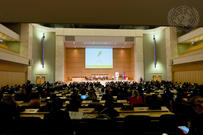Mercury pollution in China: how research played an important role in environmental policy

A research project at FNI investigates China's altered mercury emission policy, finding that China is now in a win–win situation: ownership of state-of-the-art knowledge and a more central position in international environmental negotiations.
By Kristin Rosendal, Steinar Andresen, Gørild Heggelund (researchers at the Fridtjof Nansen Institute) and Eirik H. Steindal (researcher at NIVA)
Fifteen years ago, the Chinese authorities did not consider mercury emissions to be a significant environmental problem. Since then, however, the Chinese have implemented a range of measures, focusing on a knowledge-based environmental policy and strengthening their administrative institutions. It has put the country in a win–win situation: ownership of knowledge and a more central position in international environmental negotiations.
Mercury is among the most dangerous environmental toxins we have, spreading with air and water currents across national borders. Although extremely harmful to humans and the environment, it has long been widely used in common consumer products such as thermometers and light bulbs. Globally, industrial combustion processes and small-scale gold mining account for the largest emissions.
China is the country that accounts for the largest production, use and emissions of mercury into the air – about one third of global mercury emissions to air. Although Norway has sharply reduced its mercury emissions in recent decades, and introduced a general ban on its use in 2008, mercury emissions from other countries spread to Norway. This was an important reason why the Norwegian authorities in cooperation with Switzerland took the initiative for a global agreement on mercury.
Some have opined that the time of major international environmental agreements is over, after the heyday of the Rio Agreements on Biodiversity and Climate thirty years ago. And yet, the Minamata Convention on Mercury was negotiated and signed in 2013 and entered into force in 2017. How did that come about?
How research played an important role in shaping environmental policy in China
In the early 2000s, new collaborative research ventures were established between Norway and China. China had come under international pressure, singled out as a bad guy when it came to mercury. The Chinese authorities were initially negative to a legally binding agreement on mercury. Then the tide turned in 2008: Barack Obama had been elected US president, and he had already made considerable achievements at home as regards mercury regulation. Soon after the USA gave its support to international negotiations, both China and India were on board. Without the support of these major countries, there could hardly be a binding agreement.
Was the UN wrong?
Our research shows that China was far better prepared than previously thought. China had started building its own knowledge base related to the dangerous heavy metal. The Chinese authorities acknowledged that emissions were very high, but were also sceptical to some of the criticism from international knowledge providers. In this new study, we show that Chinese knowledge production increased sharply during this period. These intensified research efforts led to higher-quality information, more skilled researchers, and better local documentation of the mercury situation.
Soon China could show that the UN Environment Programme (UNEP) was incorrect in its estimates of large mercury emissions from small-scale gold mining in China – in fact, China had banned the use of mercury in mining a long time ago. Chinese researchers could also show that mercury-contaminated fish was a problem far more widespread in, e.g., Japan than in China.
Perhaps even more importantly, the Chinese discovered that large amounts o f their mercury emissions were captured by purification measures aimed at fighting local air pollution. Through with their own research, the Chinese gained new ownership of the knowledge, and realized that the problems were admittedly large, but manageable. This made China able to better withstand international criticism.
f their mercury emissions were captured by purification measures aimed at fighting local air pollution. Through with their own research, the Chinese gained new ownership of the knowledge, and realized that the problems were admittedly large, but manageable. This made China able to better withstand international criticism.
Norway–China collaboration; international renown
Norway collaborated with China to create an action plan for reducing mercury use and pollution and helped to map what would be needed for China to be able to implement the Minamata Convention properly.
Through new efforts to build its own information base, China raised its legitimacy at home and abroad. Chinese expertise was now widely recognized, and the authorities were more able to evaluate the situation accurately. Chinese researchers increasingly published in international journals, and the Chinese delegation to the Minamata negotiations kept expanding, with new experts. China’s international reputation as a supplier of knowledge grew and grew.
Listening to the experts
The interaction between knowledge and policymaking has been studied extensively in Western countries, but with very little academic focus on countries outside Europe and the USA. Studying this interaction in a one-party state such as China shows the importance of reliable, agreed and relevant knowledge also in such a setting. Indeed, we found that knowledge had a greater place in Chinese politics when it was produced at home and not just served up by international knowledge producers.
There are many indications that China is increasingly taking research seriously and integrating it into political processes. In international negotiations, the Chinese have expanded their delegations, and now bring with them more researchers and represent atives of industry with whom they confer during the negotiations.
atives of industry with whom they confer during the negotiations.
Further, it will probably not be too difficult for the Chinese to comply with obligations under the Minamata Convention, because they have been supported by a flexible set of rules, with freedom of choice, exceptions and postponements.
Our research shows that the increasing focus on mercury research has meant that experts are heard to a greater extent, and that progress has been made in formulating knowledge-based policy. Moreover, it is easier for China to be taken seriously by other countries if it relies on recognized professional expertise in international negotiations. As the largest mercury polluter in the world and the world’s most populous country, China still has a long way to go to ensure compliance with the Convention. For that journey, high-quality home-produced, peer-reviewed knowledge and international recognition will come in handy.
